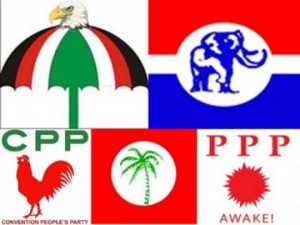Pass Political Parties Funding Bill – Dr. Gyampo
 Dr Ransford Gyampo a Senior Lecturer at the Department of Political Science, University of Ghana, has called for the passage of the Public Funding of Political Parties’ Bill.
Dr Ransford Gyampo a Senior Lecturer at the Department of Political Science, University of Ghana, has called for the passage of the Public Funding of Political Parties’ Bill.
He said the Draft Bill of 2008, when passed into law, would help minimise drastically the unhealthy competition during the electioneering as ‘would-be losers’ know they would still survive in opposition.
“If they know they will be able to run their parties and match the ruling party in terms of campaign, the acrimony, hostility and desire to win at all cost that threatens our peace would reduce,” Dr Gyampo said in Accra at a roundtable on Winner-Takes-All (WTA) Politics.
The roundtable, on the theme: “The Case of Public Funding of Political Parties” was organised by the Institute of Economic Affairs (IEA).
Public funding of political parties is an arrangement that enables the state to give financial resources or indirect assistance to political parties to enable them to carry out their activities and achieve their ultimate objective of capturing political power.
Political parties in Ghana have since 1996 been given a free air time by the Ghana Broadcasting Corporation to campaign and broadcast their policy prescriptions to the people.
Furthermore, from 1996 to 2008, the Government, through the Electoral Commission (EC), donated vehicles to political parties contesting elections.
For instance in 2008 the EC donated 50 vehicles to political parties that fielded parliamentary candidates in more than 10 constituencies; unfortunately, this gesture ended in 2008.
Dr Gyampoh, also a Research Fellow of the IEA, said political parties in opposition clamoured for public funding but developed cold feet when they got power because they saw public funding as a dangerous arsenal to their real or perceived political opponents.
He said the proposal might be unpopular in the minds of those who did not have a full grasp of what it could do to check the divisive practice of WTA politics; nevertheless, this should certainly not be the reason why the bill should not be passed into law.
“Weak parties would always produce weak and incompetent leaders who would be unable to resolve our challenges. Public funding would not only reduce fierce electoral competition,” he said.
“It would strengthen parties to attract the right calibre of people to lead the nation in frontally tackling the quagmires of poverty and underdevelopment,” he added.
Dr Gyampo described the WTA politics as the “state capture” and partisan monopolisation of state resources excluding of all others, particularly the opposition and even ordinary professionals from national governance.
He said: “Under the WTA politics, victorious political parties after elections quickly sweep the political and economic stakes of the state as they consolidate themselves in power.
“Consequently, only the ruling party becomes more visible in between elections because of its access to state resources.
“Indeed, during election campaign periods, an uneven playing field is created as the party in power exploits its incumbency and access to state resources while those in opposition operate virtually in oblivion due to limited financial resources.”
The draft bill proposes two and half percent of the total tax revenue of Ghana as the principal source of money for the Fund however other corporate entities and private individuals can also contribute to it.
The Fund is to be administered by the Electoral Commission.
The Committee of Experts that drafted the 1992 Constitution recommended some form of public funding for political parties but this has not been given full attention.
Dr Gyampo said the Constitution Review Committee also made similar recommendations but in its White Paper, Government merely noted this without saying much to commit itself.
He said the Draft Public Funding of Political Parties’ Bill was submitted to the Presidency in 2010.
He said the fact that the draft bill had remained with the presidency for over six years without being forwarded to Parliament, perhaps indicated the extent to which ruling governments in Africa were not willing to ensure a level playing field for the opposition, in terms of electoral competition.
He said the Political Parties’ Act, 2000 banned parties from seeking foreign funds to run their activities and that membership dues paid to parties accounted for only two per cent of the cost of running their activities.
Dr Gyampo said even though the financial contributions of individuals and financiers in the country could account for about 35 per cent of the cost of running party activities, these contributions were made only during the peak campaign season.
He said in Africa, countries like Lesotho, Mali, South Africa and Botswana had some arrangements for public funding of political parties.
He said in those countries elections, though competitive, were not necessarily a do-or-die affair.
Source: GNA
